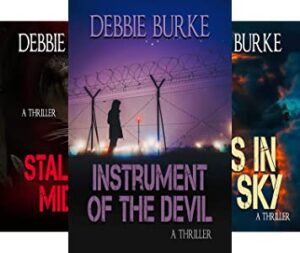 When Dexter: Original Sin came out, I had my doubts. The ending of Dexter: New Blood left a bad taste in my mouth (I won’t spoil it for you).
When Dexter: Original Sin came out, I had my doubts. The ending of Dexter: New Blood left a bad taste in my mouth (I won’t spoil it for you).
Jeff Lindsay isn’t to blame for that. New Blood and Original Sin are based on the characters from Lindsay’s long-standing series but don’t have a direct novel equivalent. The television franchise creator, Clyde Phillips, made changes to the story for the show.
Dexter: Original Sin is also a prequel that shows Dexter’s early years… how his father created “the code” to keep his “dark passenger” under control, his internship at Miami Metro Police Department, and his first kill.
Without basing the prequel on a Lindsay novel, I was more than a little reluctant to watch it. But I love Dexter! Which is a great reason to write a prequel. If you have a beloved character, readers might be interested in their early years.
Upside of Prequels
Character depth: Write a prequel to show the origin story of a beloved character or cast to explain their motivation and how they became who they are in the original series.
World-building: Write a prequel to provide a deeper look into the world before the main events i.e., history, politics, culture, etc.
Fresh perspectives: Write a prequel to showcase lesser-known characters and their perspectives.
Downside of Prequels
Unnecessary recap: Don’t write a prequel to rehash plot points from one of the original novels or the series as a whole.
Disappointing character portrayals: Don’t write a prequel to capture the essence of an established character or cast, or you’ll risk undoing all the characterization in the series.
Quality: If you don’t believe the prequel can live up to the high standards of the series, write something else.
The last thing you want is for readers to think:
- “Was the prequel necessary?”
- “Meh. It was okay, not nearly as good as the original novels.”
- “What did I just read? I feel tricked, like everything I believed was a lie.”
- Or the fatal blow: “Doubt I’ll even buy the next book in the series now.”
Too many franchises use prequels to pad the bank account, and few live up to the original series. While it may be fun for readers/viewers to revisit the characters and story world they love, too often prequels fall flat. Either they’re filled with inconsistencies in characterization, or they attempt to skew previous storylines to fit the new narrative.
Neither apply to Dexter: Original Sin.
Phillips did a masterful job of showing Dexter’s early years. A young actor named Patrick Gibson plays Dexter, but Michael C. Hall — whom we all grew to love in the original television series — narrates Dexter Morgan’s inner voice. Genius! The main reason I waited to watch the show was because, in my opinion, no other actor could play Dexter Morgan. ’Course, I never thought anyone could play a believable Hannibal Lecter, either, but Mads Mikkelsen proved me wrong.
From the first episode of Dexter: Original Sin, the screenwriter captivated me with how he portrayed the origin story. Let’s look at everything he did right.
In the first five episodes, Phillips never tried to change the character of Dexter Morgan. Instead, he merely filled in the blanks of what we missed in the original series. Patrick Gibson (young Dexter) didn’t overplay his role. The trailer misled me by zooming in on young Dexter’s evil expression — and not in a good way — when in fact, 20-year-old Dexter is simply learning to deal with the duality within him.
- He knows he’s different from other people.
- He questions why he’s different.
- He fights the desires of his “dark passenger.”
Conflict, conflict, and more conflict.
Discussions between Dexter and Harry Morgan turn almost heartwarming. Regardless of subject matter, the love between a father and his adopted son shines through. They’re doing the best they can under impossible circumstances.
As a homicide sergeant at Miami Metro PD, Harry taught Dexter “the code” shown via flashbacks in the original series.
For years, Dexter believed Harry created the code, but in season eight of the original series, we learned he had help. Dr. Evelyn Vogel, a neuropsychiatrist who specializes in the treatment of psychopaths, noticed Dexter had psychopathic tendencies as a child. So, she and Harry developed the Code of Harry as a way for Dexter to safely satisfy his needs and help rid society of dangerous predators.
Dexter: Original Sin provides an in-depth look at the code in real time, as the prequel takes place fifteen years before the original series.
Code of Harry
- Don’t get caught.
- Never kill an innocent.
- Targets must be killers who have evaded the justice system.
- Killing must serve a purpose. Otherwise, it’s just plain murder.
- Blend in socially to maintain appearances.
- Fake emotions and normality.
- Control and channel the urge to kill.
- Be prepared. Leave no trace or evidence.
- Never make a [public] scene. Stay calm and collected.
- Don’t make things personal because it clouds judgment.
- Don’t get emotionally involved.
- No preemptive killing.
The prequel never tries to rewrite the well-established Code of Harry. Instead, Phillips shows mistakes by both Harry and Dexter as they attempt to navigate their new normal. We also see Dexter’s first kill, which broke several rules for a valid reason, and learn more about Dexter’s birth mother and her relationship with Harry.
Dexter: Original Sin succeeds because it enhances Lindsay’s original series. And that may be the best reason of all to write a prequel. Otherwise, writer beware — penning a decent prequel is not an easy endeavor.
Have you ever considered writing a prequel?
If you’ve written a prequel, what was your deciding factor? What did you hope to achieve? How did readers respond?
Have you read a prequel that blew you away?
What prequel failed to meet your expectations, and why?











 Shalah Kennedy has dreams of becoming a senior travel advisor—one who actually gets to travel. Her big break comes when the agency’s “Golden Girl” is hospitalized and Shalah is sent on a Danube River cruise in her place. She’s the only advisor in the agency with a knowledge of photography, and she’s determined to get stunning images for the agency’s website.
Shalah Kennedy has dreams of becoming a senior travel advisor—one who actually gets to travel. Her big break comes when the agency’s “Golden Girl” is hospitalized and Shalah is sent on a Danube River cruise in her place. She’s the only advisor in the agency with a knowledge of photography, and she’s determined to get stunning images for the agency’s website. Like bang for your buck? I have a
Like bang for your buck? I have a 








